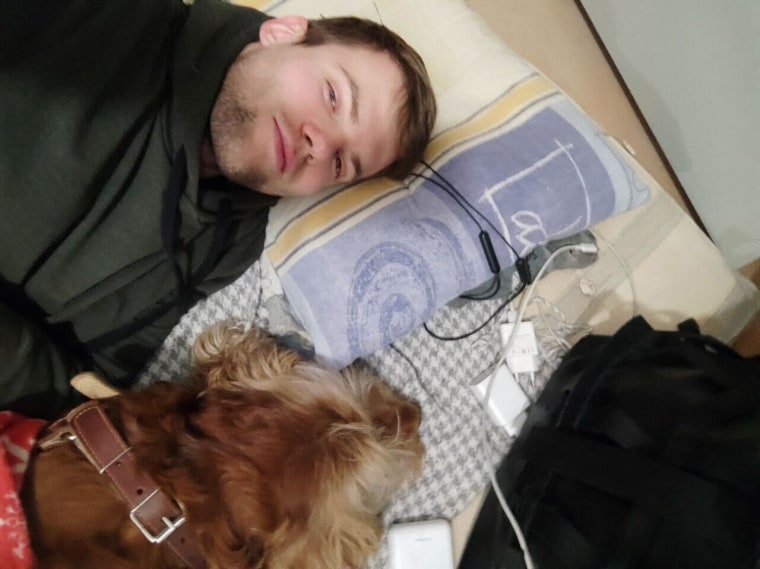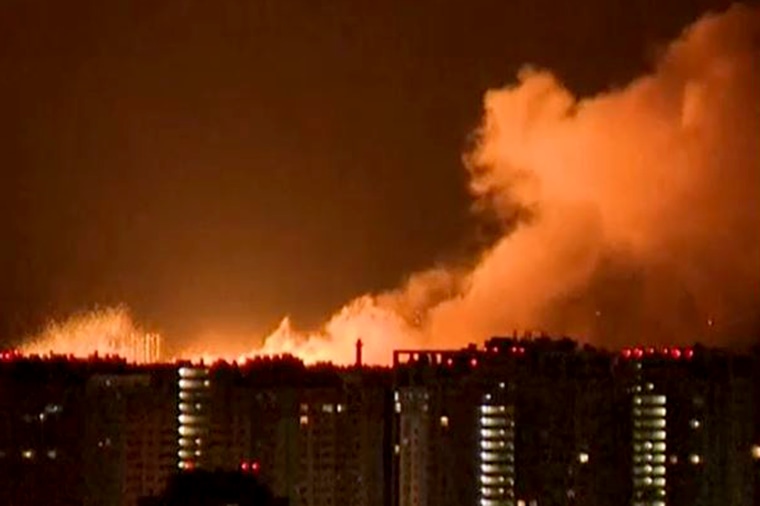Rostyslav Zavhorodnii used to paint and tutor his art students in a makeshift studio in his one-bedroom apartment in a sleepy district in southeast Kyiv.
Now, his canvases and unfinished paintings cover up windows to block out the light to prevent his building from being targeted by a Russian missile.
Six days after the Russian offensive in Ukraine began, Zavhorodnii, 26, only briefly turns on the dim light above his stove in the kitchen to cook.
Monday night, Zavhorodnii felt a shock wave rock his entire apartment complex as he was making dinner. A huge explosion about 12 miles away lit up the sky in one of the biggest blasts to hit the capital since the Russian invasion began Thursday.

Zavhorodnii grabbed his 10-year-old cocker spaniel, Willy, and ran into the basement, which was being used by residents of the complex as a bomb shelter. It’s where he has been spending many hours both day and night — sharing a mattress with Willy and talking to his neighbors, who have become “the closest of friends.”
The intimacy has been forced on them: They share a bucket as a makeshift toilet.
It’s cold but well lit and dry in the basement, Zavhorodnii said Tuesday, speaking on the phone from his apartment. He said there is even a special area to make tea and coffee to sip while he reads news on his phone about what is happening above ground. The Wi-Fi from a first-floor apartment works in the basement.
“I had a quiet life — working and hanging out with friends. Now, I am hiding in a cold basement with my dog,” Zavhorodnii said. “Sometimes it feels like a dream and I can’t wake up.”
That is the reality many who stayed behind in the capital now find themselves in.
The sounds of explosions and shelling keep people nervous during the day and awake at night, forcing them to seek cover in bathrooms, basements and subway stations.
The city of 3 million remains under Ukraine’s control. Still, a full assault could happen any minute as Russian ground forces close in on the capital.
Satellite images taken Monday showed a Russian military convoy that stretched for about 40 miles north of the capital. On Tuesday, a television tower was hit, killing five people. Earlier, the Russian Defense Ministry warned of strikes on military targets in Kyiv, the state-run news agency Tass reported.

While thousands of Kyiv residents have packed their suitcases and left looking for safety elsewhere, many, like Zavhorodnii, have refused to leave and vow to defend the capital if it comes to it.
Originally from Lviv in Ukraine’s west, Zavhorodnii has lived in Kyiv for eight years. It’s where his life is, he said.
“I don’t want to leave. This is my home,” he said when he was asked why he is staying when his life could be in danger should the Russians break through the city’s defenses. “I don’t want to just run away.”
Zavhorodnii has no combat experience and said he realizes he would be “cannon fodder” if he had to help defend the city. Still, he tried to join Ukraine’s Territorial Defense Forces, the army’s volunteer military units, but there is so much interest from Kyiv residents that he has not even been put on the waitlist.
“I am not even thinking about the scenario where I pick up arms and go fight, but if it is necessary, I will do it,” he said. “If we surrender Kyiv, we will surrender Ukraine. ... It’s better to die than become a part of Russia.”
After a pause, he added: “Being a Ukrainian right now is to fight, to fight for our country.”
Kyiv fell eerily silent over the weekend — far from the normal sounds of a bustling European capital with its busy restaurants, bars and shops — as a strict curfew was enforced to prevent sabotage by the Russians.
But people were milling around Monday and Tuesday, forming long lines for groceries and medicine to restock on essentials in case they need to hunker down.
Like Zavhorodnii, Denys Otroshchenko, an IT specialist, has also decided to stay in Kyiv — a decision he said he made before the fighting even started.
“I was born here, and it’s where I belong,” Otroshchenko, 29, said in a phone interview Monday while he was out and about in central Kyiv for the first time in days. “There is this apt word in English — ‘homeland.’ It’s not about territory. It is about walking these city streets every day and how it makes you happy.”

Otroshchenko has also been in and out of bomb shelters near his home in a trendy area of Kyiv’s Dniprovskyi District.
He said he misses his “prewar” life and work schedule, when he could enjoy five to eight hours of sleep every night. Now, he is lucky to get one or two hours, being awakened by explosions and shelling on the outskirts of the city as Russian forces battle the Ukrainian army for access to the city.
After that, he said, he spends anxiety-ridden hours on his phone, catching up on the news and the Ukrainian army’s progress. He forces himself to eat and sleeps completely dressed in case a siren sounds and he needs to run to the nearest bomb shelter.
Otroshchenko said he understands the risks if Russian forces storm the city, but he does not plan to leave any time soon. He also tried to join the volunteer defense forces, but he did not make it onto the waitlist because of poor eyesight.
Should Russian tanks roll down his street, waging a fight to protect the city and the country is “not even up for discussion,” he said.
But that is still a distant possibility, and spirits remain high among those who have stayed behind, Otroshchenko said.
Standing next to a bomb shelter by his house Sunday night, he said he had chatted with a couple of neighbors about where they will plant trees or put a new playground — when life goes back to normal.
“People understand that it’s a difficult time, but there is optimism,” he said.
